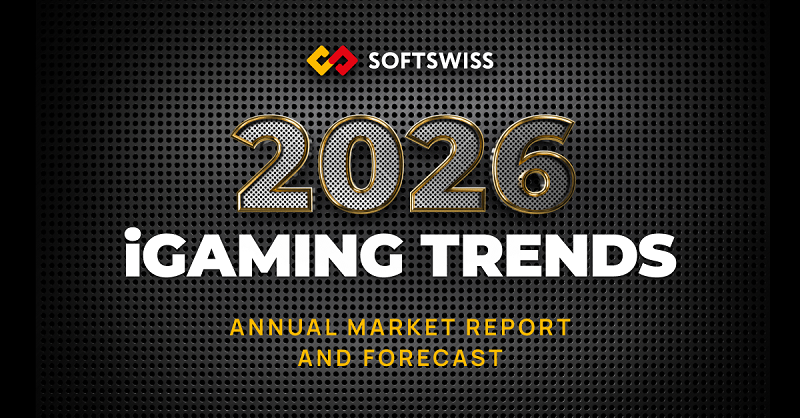iGaming industry participants are increasingly investing in AI-driven compliance tools, real-time player monitoring, and data analytics to detect and prevent risky player behavior, according to the 2026 iGaming Trends report released by SOFTSWISS in November.
Traditional responsible gaming measures, such as deposit limits and self-exclusion tools are increasingly viewed as a baseline, not a differentiator, says the report, based on a survey of over 350 industry players, investors and regulators.
“AI will be central to the future of Responsible Gambling,” says Emilia Kurzynska, Deputy Team Lead of Anti-Fraud at SOFTSWISS, which was awarded top honours for Excellence in Responsible Gaming Support by the EiGE Awards 2025.

“It makes player protection more precise by detecting harmful patterns early, while also helping operators meet regulatory standards. AI lets us identify risks long before they become visible through traditional monitoring, enabling safer, more personalised interventions that support both players and operators. As the industry evolves, this data-driven approach is becoming essential for maintaining trust and ensuring sustainable growth.”
Meanwhile, Olga Levshina, Chief Commercial Officer at BGaming elaborates on the principle of player protection. “Responsible Gambling is a shared responsibility across the industry. We focus on player protection through reality checks, stake limits, and independent RNG testing, while monitoring behaviour helps address fraud risks. Operating under international and local licenсes ensures compliance with the highest standards,” she shares.
Tech innovation protecting players
The use of AI for player protection is becoming widespread within iGaming, according to the report. Machine-learning models are able to detect subtle behavioural patterns that human oversight might miss, like rapid increases in stakes, erratic play times or shifts in spending habits — and trigger timely interventions to protect the player.
Such systems allow for a more precise and personalised approach to player protection: instead of blunt limits applied universally, interventions can now be calibrated to individual behavior. This strengthens safety and preserves player trust, meeting two objectives that are increasingly understood to be interdependent.
The use of the latest technologies also makes responsible gaming measurable, with real-time monitoring, automated reporting and algorithmic oversight offering quantifiable data. As AI applications move beyond the experimental phase, the iGaming industry regards it as part of compliance, risk management and user experience. The conversation has shifted from whether to adopt such technologies, to how to integrate them ethically, transparently and at scale.
When asked to rate the importance of AI to the iGaming industry on a scale of 1 to 10 from least to most important, more than half of respondents (56 per cent) assigned it a score of 9 or 10, according to the research report. At the same time, the share of respondents ranking the importance of AI at 6 or below fell from 15 per cent to 11 per cent, suggesting broadening industry support and waning scepticism.
Some industry examples that illustrate the use of AI to support responsible play include Mindway AI, whose tools GameScanner and Gamalyze apply a proprietary combination of artificial intelligence and cognitive science to support responsible gambling.
GameScanner analyses behavioural data and detects early signs of risky play, while Gamalyze uses self-assessment tools in the form of an interactive card game, providing personalized feedback on decision-making patterns. Gamalyze has recently been incorporated into the Hellenic Gaming Commission’s official website, providing players an accessible way to assess their own gaming behaviour and recognise potential risks at an early stage.
Tough issues addressed via collaboration
The increased visibility and growing size of the iGaming industry prompted stricter regulation and more government oversight. While complying with increased legal requirements, iGaming operators are also collaborating with government agencies and establishing innovative tools for monitoring, prevention and rehabilitation to address problematic play.
Responsible Gambling is a shared responsibility across the sector, with companies, government and industry organisations addressing player protection through the implementation of new standards, as well as rollout of voluntary reality checks, stake limits, independent testing and tech-enabled player behaviour monitoring.
In Ukraine, for example, a national standard for gambling addiction support was introduced in 2025. The framework, developed by the Responsible Gaming Centre (RGC) in cooperation with government bodies and academic experts, introduces state-approved guidelines for the social and psychological rehabilitation of people affected by gambling addiction.
In New Zealand, the Minister for Mental Health has announced a plan to expand the treatment workforce, and commission a 2025/26 independent review to refine long-term outcomes.
In Ghana, the Gaming Commission has recently mandated all online and land-based operators to implement biometric identification of players for every bet placement and withdrawal, as a means to promote Responsible Gambling among players by monitoring, logging, and reporting risky behaviour.
Ads fallout highlights need for nuanced approach
Besides changing regulation, there is also a greater awareness in the industry that responsible gaming must be handled with care. Research published by GambleAware in 2025 revealed that well-intentioned Responsible Gambling ads can have a detrimental effect on some viewers.
Research participants were shown Responsible Gambling ads and then asked about their desire to engage in gambling following the ad. As many as 63 per cent of respondents said they trusted these adverts, which in turn reinforced the urge to play. At the same time, as many as 25 per cent said the ads made them want to gamble.
These findings underscore the complexity of effectively incorporating responsible gaming into marketing strategies. It requires constant testing, oversight and behavioural research to ensure that messaging genuinely reduces risks. Data from responsible gaming campaigns should be regularly submitted for audits, and these campaigns should present measurable outcomes, according to the report.
Effective responsible gaming messaging also entails aligning marketing and compliance teams to ensure that communication about limits, risks and support tools meets the highest legal standards.
Towards a smarter, measurable future for player protection
As the iGaming industry matures, responsible gaming is evolving from a regulatory obligation into a data-driven discipline, where measurable outcomes replace abstract commitments. The integration of AI and behavioural science marks a shift toward proactive rather than reactive protections, embedding compliance and care into the core of digital entertainment.
“Responsible Gambling is no longer just about compliance — it’s about measurable outcomes,” adds Kurzynska of SOFTSWISS. “Our research shows that operators worldwide are moving toward real-time behavioural monitoring, automated reporting and transparent data frameworks. These tools allow regulators, operators and players to speak the same language: one grounded in evidence,” she continues.
“As AI becomes embedded across compliance, risk management and user experience, the task is shifting from reacting to problems to preventing them entirely. This level of accountability is where the industry is heading.”
With regulation tightening and technology advancing, the industry’s current focus is ensuring these tools are used ethically and effectively, supporting innovation while strengthening transparency, accountability and player trust.






Click here to change your cookie preferences